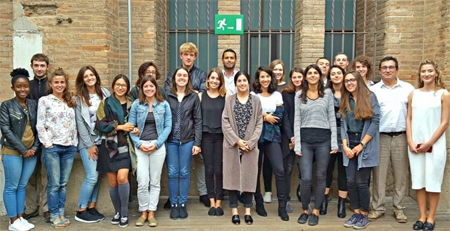The master's degree in Migration Studies receives support from the Intercultural Cities Programme of the Council of Europe
The master's degree in Migration Studies receives support from the Intercultural Cities Programme of the Council of Europe
The “Challenges of Interculturalism” course (November-Desember 2016), under the Master in Migration Studies at the UPF, is supported by the Council of Europe’s Intercultural Cities programme, an initiative that manages more than 100 cities around Europe (and worldwide) with the general aim of promoting an intercultural approach at the local level.
 At the sessions, lecturers Dani de Torres and Gemma Pinyol, both experts of the Council of Europe, shared their international and local expertise on the public management of immigration and diversity policies, to offer a comprehensive approach of intercultural policies to the master's degree students. Dani de Torres is also director of the Spanish Network of Intercultural Cities (RECI) and Gemma Pinyol, associate researcher by GRITIM-UPF, is its coordinator.
At the sessions, lecturers Dani de Torres and Gemma Pinyol, both experts of the Council of Europe, shared their international and local expertise on the public management of immigration and diversity policies, to offer a comprehensive approach of intercultural policies to the master's degree students. Dani de Torres is also director of the Spanish Network of Intercultural Cities (RECI) and Gemma Pinyol, associate researcher by GRITIM-UPF, is its coordinator.
The RECI is part of the Intercultural Cities programme and is currently composed of 16 Spanish cities, which share methodologies and best practices and promote debate and innovative policies to implement the intercultural approach city level.
During the sessions, the lecturers offered practical tools on and approaches to evidence-based policy making. The link between knowledge formation and intercultural decision-making processes, and the link between intercultural policy design and its implementation were examined through concrete case studies.
The sessions included conceptual frameworks, debates and analysis of political strategies and best practices, and special attention was paid to how local authorities deal with diversity to strengthen social cohesion and promote development. During the sessions, the students virtually became local authorities, to finally design intercultural public policies and actions. Real local experiences and theoretical discussions helped them in this challenging task.
An example of cooperation between academia and policy to address social diversity
The collaboration between GRITIM-UPF, RECI and the Council of Europe aims to improve the necessary link between academia and policy making, and is a great example of how cooperation between different actors is crucial to enrich both academic research and concrete policies at the highest level, combining the global and the local.
In view of the problems suffered by the traditional models of integration and the accommodation of diversity, the interculturalist approach has gradually gained ground in certain academic, political and social fields. The fact that the master's degreein Immigration Studies pays attention to this path-breaking new policy paradigm contributes to fulfiling the training aims of GRITIM-UPF by putting students in contact with new theoretical and policy debates.
The top-level experts teaching on the course certainly contributed to developing skills to understand the process of change in policy paradigm that we are currently experiencing in our super-diverse societies, mainly at the local level.
